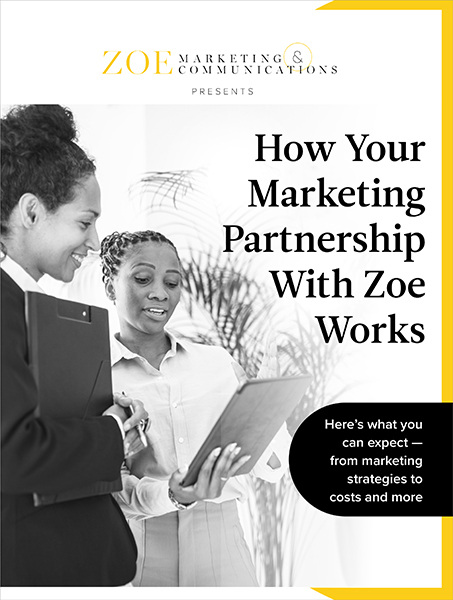
Download Your Guide to Marketing With Zoe
From the first steps and your role in success to specific services, pricing and success stories, learn all about partnering with Zoe.
Topics:
February 9th, 2023 | 2 min. read
By Kim Kovelle

Hiring a marketing agency is an investment, and the pressure to see fast results is real.
We understand. Since 2020, Zoe Marketing & Communications has helped businesses navigate concerns about strategy, timelines and creative work.
In this blog, we break down five ways to build a strong agency relationship. Your agency’s job is to grow your business. Here’s how you can work together to make that happen.
From the first steps and your role in success to specific services, pricing and success stories, learn all about partnering with Zoe.
A client needs assessment (CNA) is the first step in your relationship. It’s a deep dive into your goals, audience and past marketing efforts.
A CNA can feel daunting — there’s a lot to evaluate! But it builds the foundation for success by:
A great agency listens to your ideas but also crafts a plan based on what works. That sometimes means adjusting expectations.
One common challenge? Businesses assume a single tactic — say, TikTok ads — is the key to success. But is it the right fit?
A strong agency typically uses a mix of tactics. They’re focused on:
Even experienced agencies refine their approach based on real-time data. No one can guarantee conversions right away.
Tweaking your audience can feel frustrating, but it’s necessary. A good agency:
Your creative (messaging, visuals, ads) must look good and convert.
Businesses sometimes have a natural instinct to “add more,” but keep in mind clarity sells — and campaigns take a month or two to gain traction.
Agencies ensure:
Marketing isn’t “one-and-done.” It’s an evolving process that requires patience and trust.
Feeling anxious about results is normal, but working with an agency means embracing the process:
A strong agency-client relationship leads to better marketing results.
This blog tackled five key tips to build a strong relationship, from CNAs to creative decisions.
If you’re looking for a collaborative agency partner, talk to us at Zoe Marketing & Communications. We offer free “getting to know you” CNAs so you can decide if we’re the right fit.
Still weighing your options? Learn more about agency dynamics:

From the first steps and your role in success to specific services, pricing and success stories, learn all about partnering with Zoe.
As Zoe Marketing & Communications’ content manager, Kim Kovelle brings over 20 years of writing and editing experience in metro Detroit. She has strong roots in community journalism and a knack for making complicated topics make more sense.
Topics:
